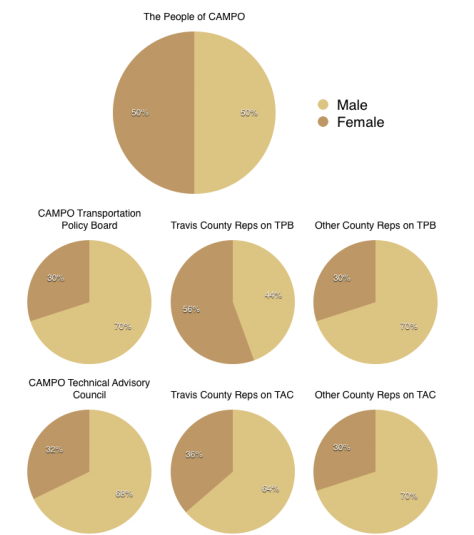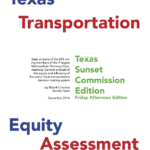Metropolitan Planning Organizations rely on advisory committees to review work produced by their staff and to make recommendations to their decision making bodies, who then have the final say on all projects and every dollar of regional transportation funds.
CAMPO, the Austin region’s MPO, has a Technical Advisory Committee (TAC) comprised of appointed representatives from local governments and transit agencies. They then pass on recommendations to the Transportation Policy Board (TPB) which is comprised of regional elected officials and transportation professionals.
This afternoon at 5pm on UT Campus, there is an opportunity to review CAMPO’s performance before the federal government. If you can’t make it in person, you can submit comments via email.
Given the pervasive impact of the decisions made by these bodies, and the various interests and divisions of stakeholders, these boards must be careful to reasonably and accurately represent the region’s residents. As a conduit for federal transportation funds, MPOs are subject to Title VI of the Civil Rights act, which prohibits discrimination in the administration of federal funds on the basis of race.
Race is only one category relevant for consideration. To accurately represent the region, MPOs must also balance rural, sub-urban, and urban interests, the fifth of Americans with disabilities, gender representation, and more.
Accurately representing the careful balance of interests is a difficult challenge, but one that MPOs are responsible for and must strive to address. The simplest diversity benchmark is the demographic composition of the TAC and TPB themselves. How closely do the people on these boards reflect the region they are intended to represent?
Farm&City investigated exactly these questions for the 9 largest MPOs in Texas and for CAMPO in particular. Our findings reveal uniform disparities in racial, gender, and disability representation everywhere we looked.

These disparities have significant immediate consequences for the region. For example, there are indications that women prioritize spending on safety and walkability more than men, and it is reasonable to believe that this would be reflected in policy decisions if women were allowed equal seats at the table. Certainly, women have historically not been adequately represented in policy making, and the City of Austin alone has a $400 million dollar need for basic, ADA compliant sidewalks.
Similar concerns hold for racial composition, urban-suburban-rural interests, and accessibility. Of the 203 people on the decision making bodies of the 9 largest Texas MPOs, we found only one with an apparent disability.
To learn more, see our reports on representation throughout Texas, presented to the state legislature’s Sunset Commission, and our special CAMPO Equity Assessment.
It doesn’t have to be this way
There are innumerable factors that lead to the final composition of these bodies. Many are out of the direct control of those who make the final decision in the pathway of deciding representation. Representative democracy, especially at a large scale, requires vigilance on the part of all involved. For example, people must vote to elect women, people of color, and people with disabilities in order for there to be the opportunity for more accurate representation on the Policy Board.
However, the present powers-that-be can substantially correct for decades of injustice and the extreme imbalance of policy making in favor of the perceived interests of non-hispanic white men. The Campo Policy Board Joint Powers Agreement ensures representation of various counties, cities, and transit authorities. It requires that each local government ensure that their representation on CAMPO committees reflects the diversity of their jurisdiction over time. Several of the cities and counties have never sent anyone who was not a non-Hispanic White male in the last five years of records that we reviewed.

Reports – click to read



